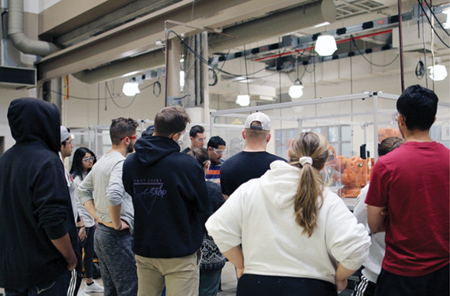
Students in the Harold and Inge Marcus Department of Industrial and Manufacturing Engineering at Penn State will be ready to add invaluable insight to their future companies by being able to analyze machine data to prevent productivity losses.
Students in the Harold and Inge Marcus Department of Industrial and Manufacturing Engineering (IME) at Penn State will learn how wireless sensors and cloud computing can impact the manufacturing field, thanks to a recent gift from KCF Technologies.
KCF Technologies donated several SmartDiagnostics wireless vibration sensors to the department. The sensors are attached to various equipment found in the Factory for Advanced Manufacturing Education (FAME) Lab.
According to KCF Technologies, machine breakdown costs the United States economy up to $2.5 trillion a year in unplanned downtime and lost production. With the addition of the sensors in the FAME Lab, students will use sensor-collected data to learn how to analyze a machine's health and when to repair the machines before they break down, ultimately leading to a decrease in economic loss.
The sensors will also enhance the course work of IE 470: Manufacturing Systems Design and Analysis. IE 470 is an undergraduate class taught by Vittal Prabhu, Professor of Industrial Engineering and Charles and Enid Schneider Faculty Chair of the Penn State Service Enterprise Engineering Initiative.
The course provides students with an understanding of modern manufacturing systems by exposing them to technology, design and analysis methodologies, robotics, automation and techniques for improving productivity in manufacturing.
"It is important that we are teaching the students how to analyze this kind of information because I think it is the future of industrial engineering," Prabhu said. "It is going to make them more desirable in the job market because they are ready for these changes."
The wireless vibration sensors transmit data in real time to a cloud-based data storage and visualization platform where students can log in to view the data from any operating system and without downloading any software. The visualization platform provides historical trend views where students can track and understand changes in sensor data over time and correlate the information with the machine's health. No specialized training is required to use the system.
The sensors are mounted on several of the ABB robotic arms and a HAAS CNC machining center to continuously measure the vibration of machines. Prabhu relates the sensors to a stethoscope-it is like checking a heartbeat. If the vibration signatures of the machine appear to be unusual, the cloud platform system has capabilities to provide predictive information with configured "warning" and "alarm" notifications, which means that the machine is due for maintenance.
The sensor can be easily mounted to any metallic surface via its magnetic base to measure vibration and temperature. The sensor consistently transmits the real-time data to a gateway or a hub, similar to a receiver box, which then pushes all the received data to the cloud platform over the internet.
"The sensors are helping put industrial systems into Industry 4.0, otherwise known as the Fourth Industrial Revolution," Prabhu said. "Industry 4.0 is looking at how data, automation, the Industrial Internet of Things (IIoT) and more, work together synergistically."
The sensors will also be used in Rakshith Badarinath's research on polymer additive manufacturing (AM) using ABB robots. Polymers have long been used in 3D printing due to the material's ability to soften and flow when heated but become hardened when cooled.
As a graduate research assistant for the department, Badarinath studies process modeling and real-time control of fused filament fabrication polymer AM processes using the ABB industrial robot arm.
"This is the age of connectedness, and the wireless sensors like those of KCF are easier to set up and make data acquisition much easier in research," Badarinath said. "I am able to use these sensors to monitor vibrations in the ABB robots and how much these vibrations affect quality of the printing process. This enables us to closely monitor and control the resulting product quality."
Jason Joshi, a KCF Technologies Partnership Development Manager and certified vibration technologist, assisted the department with the installation of the new sensors. Joshi, an IME alumnus, explained that optimal sensor placement is important because sensors need to be as close to critical components as possible to receive data that is good quality.
Jeremy Frank, CEO and co-founder of KCF Technologies, stated that he is excited to support the FAME Lab and IME students. "Hands-on experience is essential to equip students with the necessary skills to succeed professionally," he said. "We see sensors as an important tool in the IIoT landscape and Penn State is in a position to play a pivotal role in preparing students to transform American manufacturing. We look forward to opportunities to connect Penn State's best and brightest with our technology and customers."
For more information contact:
KCF Technologies
336 S Fraser Street
State College, PA 16801
814-867-4097
sales@kcftech.com
www.kcftech.com
Penn State
College of Engineering
101 Hammond Building
University Park, PA 16802
814-865-7537
engr.psu.edu